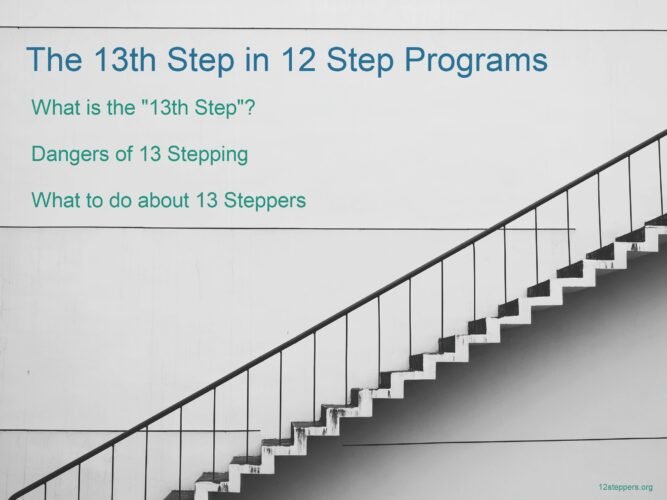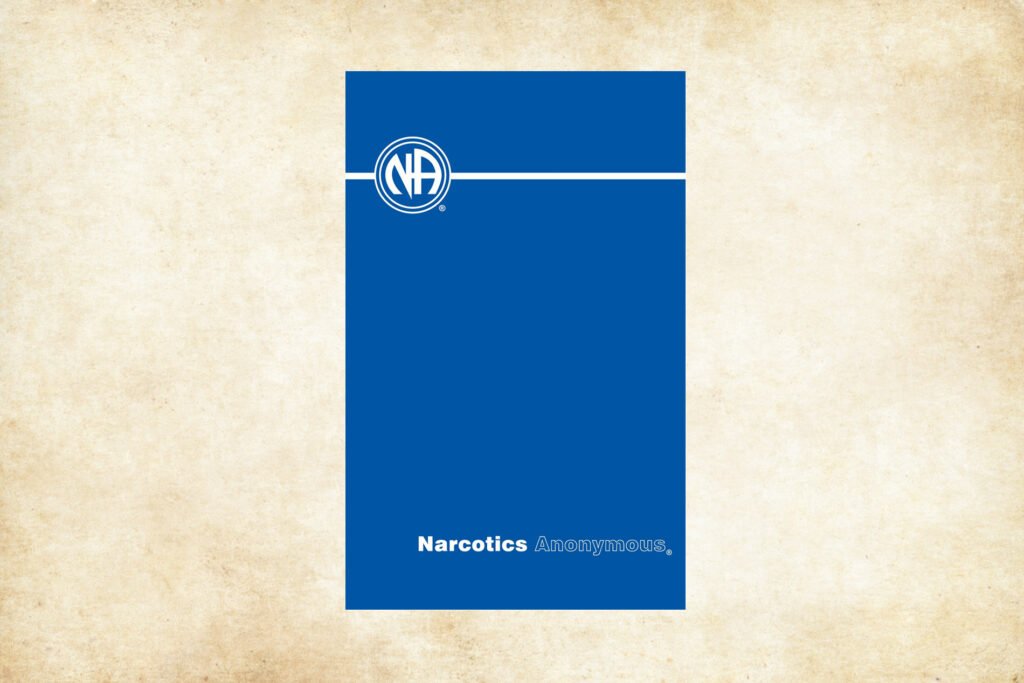What is “the 13th step”?
In 12-step programs like AA or NA, “13th stepping” describes the inappropriate behavior where an established memberAn individual who attends 12-step program meetings and has the desire to overcome addiction. More pursues romantic or sexual relationships with newcomers, exploiting their vulnerability and potentially jeopardizing their recoveryThe process by which addicts attempt to break the hold a certain substance or behavior has on their lives. This can refer to participation in a wide variety of methods. What they all have in common, is a sense that life is improving and the addict is regaining control. More. To maintain maintain a safe and supportive environment for all members, this behavior is widely discouraged within recovery communities. Historically, 13th steppingThe term "13th step" or "13th stepping" describes a scenario in which a member of a 12 step program, often with more experience and time in the program, develops a romantic or sexual interest in a newcomer who is less experienced and more vulnerable. The 12 step programs' core values are all violate... More used to be a positive thing symbolizing a lifelong commitment to sobrietyIn 12-step programs, an individual is sober when they are no longer partaking in the behavior or substance to which they are addicted and living a better life following the program. Both are necessary to achieve sobriety. More, only fully realized upon death.
In recovery circles, 12-step programs have stood as pillars of hope and transformation for countless individuals. The origin of these programs is deeply rooted in the history of Alcoholics Anonymous (AA), which has set a precedent for similar frameworks, including Narcotics Anonymous (NA). These programs outline a sequential process of spiritual and character development aimed at overcoming addiction and fostering a supportive community.
Beyond the 12 steps lies a lesser-known concept that often stirs up curiosity and concern within recovery circles: the idea of “the 13th Step”. It’s important to note that this “step” isn’t an official part of the 12 step programs. Instead, the term has evolved within the recovery community, carrying a dual meaning — one lesser know that is historically poignant, and another more common definition that holds a more cautionary tale.
What is the meaning of the the 12 Steps?
The 12 steps form a framework that guides individuals through a process of self-examination, acknowledgment of personal shortcomings, and making amends to those harmed. It begins with the acceptance of powerlessness over one’s addiction and the belief in a higher power’s ability to restore sanity. From there, participants start on a path of self-inventory, admission of wrongs, and seeking forgiveness. The latter steps involve continued personal inventory and the use of spiritual principles to assist others in their recovery.
The Role of Steps in Recovery
Each step in the 12 stepsThe term "12 steps" refers to the core principles of the approach to addiction exemplified by Alcoholics Anonymous and other similar groups. The 12 steps are a set of guidelines designed to help individuals overcome addiction and rebuild their lives. They were created by the founders of Alcoholics A... More of AA is designed to build upon the last, creating a foundation for personal growth and sobriety. The role they play in recovery is pivotal – they’re not just actions to be taken, but milestones that mark an individual’s progress towards a sober and healthier life. The steps encourage accountability and responsibility, facilitating a transformation that often extends beyond the individual to positively affect their family and community.
The principles enshrined in the steps are not exclusive to addiction to substances; they have been adapted to aid in a variety of compulsive behaviorsThese are behaviors in engaging in due to a strong urge to do so. Compulsion may be difficult to control but is mostly manageable. If compulsion turns into addiction, the problem becomes more severe. More, offering a universal blueprint for those seeking change. They are the steps to recovery that have been time-tested, with countless recovery stories bearing testament to their effectiveness. Yet, in the shadow of these successes, there exists the cautionary concept of “13th stepping“, a term that every newcomer to these programs should be aware of as they navigate their recovery journey.
The Concept of the “13th Step” in Recovery Circles
The journey of recovery often involves challenges and personal growth. The 12 steps laid out by Alcoholics AnonymousThe original 12-step fellowship, formed in 1935, to help alcoholics, regain control over their lives. It remains the largest 12-step organization and has contributed to the sobriety of millions worldwide. Read more about Alcoholics Anonymous More (AA) and adapted by Narcotics AnonymousNA is the second-largest 12-step program. Formed in 1953, it is designed to help those who wish to recover from drug addiction. More (NA) and other 12 step programs are considered to be comprehensive framework. However, within these supportive environments, a non-official term, “13th Step,” has emerged with a duality of interpretations.
Traditional Interpretation of the 13th Step – 13th Step AA History
The “13th Step” initially held a poignant significance, symbolizing a lifetime commitment to sobriety. It was an invisible threshold, only crossed after one’s death, representing a sober life lived to completion. This interpretation has less to do with the practical elements of recovery and more with the lifelong dedication to the principles and lifestyle changes advocated by the 12-step programA 12 step program includes 12 steps of recovery to help those struggling with substance addictions or behavioral addictions. The 12 steps are also used in programs dedicated to helping loved ones of addicts. 12 step programs include 12 step meetings where members go to share their experience strengt... More.
Modern Interpretation of “13th Stepping”
In more recent times, “13th stepping” has taken on a far more ominous meaning. Within the 12 step fellowships like AA or NA, it refers to the practice of established members forming relationships with newer, more vulnerable individuals. These relationships can take many forms but are often characterized by an imbalance of power and experience and are often romantic or sexual in nature. The term “13th stepping” has become a warning label for this predatory behavior, alerting new members to the potential for exploitation.
The Dangers of 13th Stepping
Exploitation of Newcomers
13th stepping is a serious concern within recovery communities as it can lead to the exploitation of newcomers who are often in a fragile state, seeking support and guidance. The practice of 13th stepping is seen as a breach of the trust and safety that AA, NA and other 12 step programs are meant to foster. It’s important for recovery spaces to remain ‘sanctuaries of safety’ where every individual feels secure in their journey toward sobriety.
Impact on Sobriety and Recovery
The repercussions of 13th stepping extend beyond individual incidents of misconduct. It can threaten the sobriety of both the person who is 13th stepping and the newer member, ultimately undermining the recovery process. It introduces unnecessary complications, emotional turmoil, and can be a catalyst for relapseRelapse in the context of 12-step programs refers to the act of reverting to harmful behaviors associated with addiction after a period of recovery. This return to substance use or compulsive behavior disrupts the recovery process and often leads to a resurgence of destructive patterns that the indi... More, which is why many within the community advocate for a year of sobriety before entering any romantic relationship. This is not an official requirement of 12 step programs but more of a suggestion from sponsors.
Red Flags in Recovery Settings – Recognizing the Signs of a 13th Stepper
Identifying a 13th stepper requires an awareness of certain red flags. These may include individuals who seem overly interested in the personal lives of newcomers, those offering special attention outside of meetings, or someone pushing for a relationship or other personal gain.
Protecting Vulnerable Members of AA/NA
12 step meetings are often the first line of defense against 13th stepping. It is a collective responsibility to protect vulnerable members by fostering an atmosphere of awareness and support. Senior members and sponsors play a critical role in educating newcomers about the importance of boundaries and the potential risks of forming relationships too early in the recovery process. The community’s vigilance in recognizing and discouraging 13th stepping behavior is essential in safeguarding the recovery process for everyone involved.
What To Do If You Feel Uncomfortable Around Another Member
If you or someone you know has been 13th-stepped or you are uncomfortable about another members’ behavior, it’s important to speak with your sponsorAn individual in a 12-step program requires a sponsor to help them work the steps and hold them accountable for their recovery. The sponsor should be readily available when help is needed. A member with a sponsor is considered to be the sponsee. More about the issue. Often, a sponsor can guide you on how to navigate uncomfortable or predatory situations involving other members and they may suggest speaking with the chairperson of the meeting. If the issue is serious enough, there may be a group conscience vote on how to handle the situation. Safety in meetings is important! When someone feels unsafe, that may lead them to leaving their 12-step fellowshipThis refers to the members of AA and the bonds of support between them. It is this fellowship that allows addicts to share their stories and accept each other in a world that is not always understanding. More and can lead to relapse.







